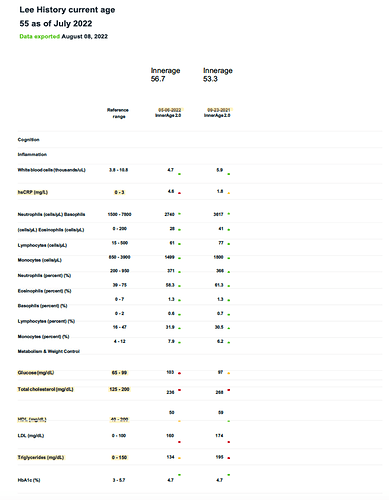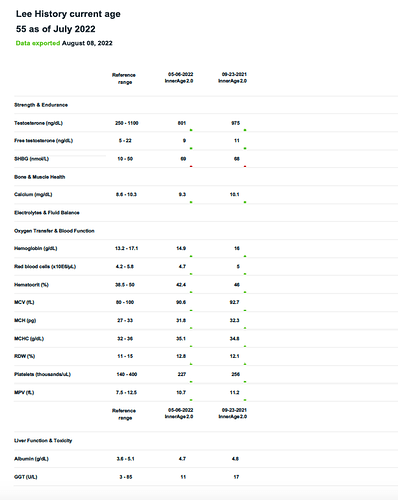I’m currently 55 years old and started Rapamycin on Oct 1, 2021. I had my first innerage blood test in Sept of 2021 prior to starting the mediation. I start at 1mg per week for the first month and increase an additional 1 mg each month. When I had my second Innerage blood test I was taking Rapamycin 4mg per week for the past 3 months prior to that test. The second blood test was in May, 2022. My actual innerage went up after being on Rapamycin. I’ve inserted the test results next to each other and have highlighted some areas. I’m a caucasian male 6’2" and weigh 205 lbs. I’ve had high cholesterol for the past 4-5 years. I really don’t have any other health issues.
Please let me know your thoughts. I will test again soon and will be interested in comparing the results again after being on 5mg/week for the past 3 months.
Good data… assuming diet and lifestyle remained fairly consistent?
As I suspected, even these low doses will lower endurance capacity.
Good to see your LDL and triglycerides coming down though. Have you seen any weight loss?
“My actual innerage went up after being on Rapamycin. I’ve inserted the test results next to each other and have highlighted some areas.”
Interesting. I experienced almost two years of aging after using rapamycin for a few months according to the Levine spreadsheet epigenetic age calculator. The same with the Aging Ai calculator which has many more input parameters.
Maybe it’s time to examine the usefulness of these calculators.
I think I’m trending this way too, although these bioclocks are big data population level aging/mortality.
Remember, rapamycin is a “paradoxical” drug…you may get some wonky counter aging markers, but yet reach lifespan extension! These clocks cannot handle rapamycin. The big thorough study on mice on rapamycin concluded rapamycin dosen’t slow down aging, simply blunts cancer, and has AGE-INDEPENDENT pathways to lifespan extension.
Rapamycin extends murine lifespan but has limited effects on aging
“Longevity effects of rapamycin may, however, be due to rapamycin’s effects on specific life-limiting pathologies, such as cancers. While rapamycin did extend lifespan, it ameliorated few studied aging phenotypes. A subset of aging traits appeared to be rescued by rapamycin. Rapamycin, however, had similar effects on many of these traits in young animals, indicating that these effects were NOT due to a modulation of aging, but rather related to aging-independent drug effects. Therefore, our data largely dissociate rapamycin’s longevity effects from effects on aging itself.”
So we might have to throw out “some” of these clocks as biotracking tool on rapamycin.
If you dig through this study, especially the supplemental, you will find re rapamycin and CVD (albeit in mice), both positive, neutral, and negative effects of rapamycin and cardiovascular remodelling! So it’s not a slam dunk ONLY positive for cardio remodelling finding.
Thanks for posting this as I hadn’t considered the relationship between the causes of death in mice versus humans and how that may alter how that may play a role in the relative interspecies lifespan extension.
To put this in context, my understanding is that 96% of the control mice died of cancer vs about 1 in 6 human deaths are due to cancer. As a result, if Rapa’s primary lifespan extension mechanism is blunting cancer, then the overall lifespan extension in humans should be much smaller than that in mice.
The ITP study used 42 ppm (7mg/kg) per day for 20 month old mice, which roughly translates to about 0.58mg/kg per day for a 60 year old human. This is a massive dose of Rapa and results in about a 10% lifespan increase in mice. Plus, the lifespan extension appears to be correlated to the dosage so lower dosages like those that most of the Rapa biohackers are taking would probably provide a lifespan extension significantly less that 10% in mice. If this lifespan increase is primarily due to blunting cancer, then the corresponding lifespan increase in humans should be a lot less.
I think this good information to consider in the Rapa risk/reward calculation. Rapa is just going to be one tool in the lifespan extension tool kit.
Your analysis is very succinct and probably as good a prognostic outcome for human Rapamycin translation than anything written on this site or anywhere else! I would generally agree with you.
It dosen’t mean something new and better might come along to hop onto, but for now, some healthy skepticism and muted expectations. If anything, people should look at the entirety of their longevity hacks, enhance, add new, and don’t put all your chips on Rapamycin.
Since both the development of cancer and aging itself share a common mTOR pathway involving hyperfunction, it’s very difficult to tease it out. It’s very possible that cancer is suppressed due to the slowing of aging.
The old problem of cause and effect… does rapamycin slow aging, and therefore reduce the incidence of cancer, or does rapamycin just prevent cancer, and thus lengthen their lifespan?
Either way its probably a good thing.
I haven’t reviewed the literature in depth, but will.
Its tough to believe that Rapa only benefits cancer. I haven’t looked through every study, but It’s been tested on quite a few animals, starting at multiple different ages, and I’d imagine a ‘cancer only’ outcome would’ve stuck out.
However… I do agree that it seems very unlikely we’d get the same percentage benefits of short-lived animals. If rats get a 12% increase in lifespan starting at 20 months… I doubt we’d get a 12% increase in lifespan starting at 55. But I’m wagering we’d still get some benefit… but we’ll find out soon enough. Also, don’t take the levine spreadsheet too seriously. It can be fudged in various ways. But something like the GrimAge epi clock would be more convincing.
Some group wrote an opinion piece stating that the benefits were entirely from cancer prevention. Blagosklonny wrote a rebuttal piece that I can’t locate, but it was well done.
I’ve read on several occasions that the total elimination of cancer would give us only an additional 3 years. Not sure how they calculated that.
Yes, diet and lifestyle have been consistent. One of my biggest disappointments has been no change in being able to lose weight. I guess I was excited and expecting more or an effect on weight loss after reading Dr Greens results.
I think most of us don’t lose weight on rapamycin - at least not on the typical doses we are usually on (5 to 10mg/week).
I found that metformin was very helpful for weight loss - lost about 15+ lbs over a few months very easily, and then also canagliflozin - about 10 lbs very easily in a few weeks then it plateaued. I think rapamycin does probably help reset your “set point” on weight - I no longer drift back up to my previous weight when I’m not focused on my eating and exercising on a regular basis.
Just a reminder that most of these age trackers rely on inflammation a lot more than anything else for age prediction. Your CRP figure went up quite a bit, so I would attribute most of your age increase to that. iMHO
Have you compared your results with what you would get if you punched your blood test results in the Levine Phenotypic calculator and the Aging.ai (3.0) test? http://aging.ai
Seems like an easy thing to do, to get another view on your blood work results. A Friendly, Biological Age Reduction Competition?
I think MKs TRIAD study will be most revealing because he’s using doses of only 0.15mg/kg/wk which is approximately 0.081mg/kg/wk in humans.
The study is statistically powered to prove a median lifespan extension of 15%. It may not hit that end point but presumably his smaller preliminary trials suggest it’s possible.
Just remember 15% is about 12 years. I’ll take it!
I don’t think rapamycin by itself will achieve substantially greater lifespan in humans, though its benefits go beyond cancer prevention to controlling cellular senescence and Atherosclerosis. Since cancer and Atherosclerosis are the two leading causes of death, that alone would be a big step forward. But if you read Blagosklonny’s early papers, he envisioned rapamycin as just one of a group of life extension measures, including metformin, ACE inhibitor, statin, exercise and diet, to extend health span. You can’t just choose one.
I think he’s pretty much changed his mind since on metformin and statins.
I hope so too…a much larger animal model, closer to humans, with a wider variety of mortalities. But I’m not waiting for this outcome…10 yrs +/- for signal to show itself?

